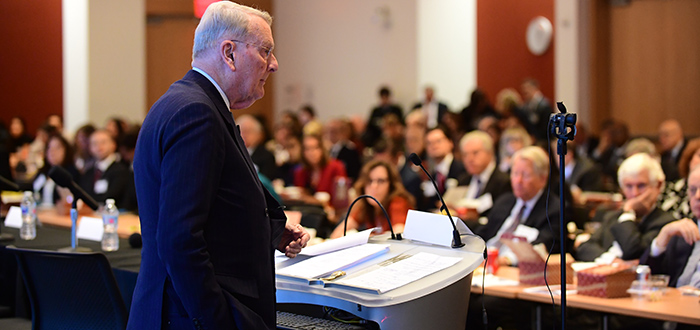According to Hon. Charles N. Brower, all life is political, and the European Union’s proposed international investment court is no exception. Judge Brower discussed the proposal’s many problems during his keynote address at the Fordham Conference on International Arbitration and Mediation on November 17.
The conference, “Facing the Future in International Arbitration: Evolving Issues, Practices and Solutions,” brought together experts from around the world to discuss and debate the various facets of international arbitration. Topics included gender issues, mock trials, arbitrational duties, third-party funding, the role of the expert, and arbitration remedies. The conference was co-presented by the Conflict Resolution and ADR Program and Louis Stein Center for Law and Ethics at Fordham Law. It was co-chaired by Louis B. Kimmelman, partner and co-leader of global international arbitration practice at Sidley Austin LLP, and Edna Sussman, independent arbitrator and mediator and distinguished practitioner in residence at Fordham Law.
Judge Brower, who delivered the keynote “From the Two-Headed Nightingale to the 15-headed Hydra: The Many Follies of the Proposed International Investment Court,” has served for over 34 years as a judge on the Iran-United States Claims Tribunal. He currently also sits as an ad hoc judge on the International Court of Justice and is arbitrator member of 20 Essex Street Chambers in London. The American Lawyer has dubbed him “the reigning king of international arbitrators.”
Brower showed his kingly prowess in critiquing the EU’s proposal.
Targeting the “two-headed nightingale,” Brower critiqued articles by Professors Jan Paulsson and Albert Jan van den Berg. According to Brower, the articles presume that party-appointed arbitrators are untrustworthy and may violate mandates of impartiality. Brower argued for the importance of party-appointed arbitrators and counter-opinions in international arbitration. Paulsson’s and van den Berg’s suggestions to restrict parties’ right to choose arbitrators and tribunal members’ ability to share dissenting perspectives, according to Brower, would prove monstrous.
The 15-headed hydra, according to Brower, is the proposed appointment of 15 so-called judges: five from Canada, five from the EU, and five from other nationalities. The process, Brower stressed, is unavoidably political.
“This is a political process, and there’s no way of un-politicizing any process in which states or international organizations are the source of the appointments or the election,” he said. He noted that politics will shape which five of the 48 (soon to be 47) EU countries will be represented.
Examining the status of the EU proposal, Brower remarked that there are friends and enemies of his perspective on the proposal’s folly. The biggest ally, he said, is the European Court of Justice, which rules on matters of EU law. Brower cited a rule that dispute settlement provisions must be ratified by all member states of the EU, and not just by the European Commission, because it intrudes too much on national judicial systems. And getting all the states together in this case, said Brower, is a hard thing to do.
The biggest enemy, according to Brower, is the United Nations Commission on International Trade Law.
“Why do these acknowledged leaders of investment dispute arbitration as we know it bring termites into our wooden house of investor state dispute resolution?” Brower asked. “Why are they putting themselves out there to tear down what made them what they are?”
According to Brower, fear is the primary cause behind all the uproar. And fear, he stressed, is a poor advisor. As an example, he cited environmental cases. “No investor state tribunal has every found a legitimately environmental regulation or law to be in breach of any treaty,” he said. “But you still get outcries.”
“People forget that the actual record is good, and states, by the way, win the majority of cases that are tried to an award,” said Brower.
He observed that a major problem is the unwillingness of anyone who has credibility to defend the current system. He noted the all-too human tendency to protect one’s reputation.
As for Brower, he was adamant in his hope that the proposed court will not be established. He reiterated his continued trust in international arbitrators, and he critiqued the public press for dismissing such institutions.
“They don’t understand the psychology of the people who do this,” said Brower. “We like to do it because it’s an important task and we think we have something to bring to the table.”




